#i think a lot about how koyomi and ougi have different experiences
Text
smth abt ougi and queer narrativeness
thinking you won't be loved because of what you are. struggling with your identity
dying because it would be better for the story, buying into the narrative and conforming to it in that way. being the inherent bad guy, a monster
idk theres smth about it
and then also a feminist aspect
your existence being literally for some guy. only mattering for that, for someone else, until it turns out you have your own value too, actually.
it's just... yk
#until of course nisioisin decided this wasnt true actually#ougiposting#monogatari#oshino ougi#the monster stuff could go for others too but yeah#its just. its nice. ougi is trans#n prolly gay#if u cant acknowledge ougis queerness u simply have a Wrong way of understanding ougi#Wrong and Bad#i think a lot about how koyomi and ougi have different experiences#they do not see the same monday
12 notes
·
View notes
Note
next question
i think you will like this one...
what parts of hanekawa makes her your favorite? give me the full blorbo thoughtdump 😈
OH so you want it to be go time? It's go time? I suppose it's go time.
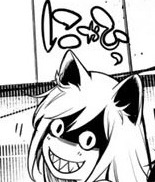
Note I am NOT a writer or well articulated so this is going to be ALL over the place fdjkhds.
So just to begin, Hanekawa is such a fun and mysterious character for a lot of Bakemonogatari. She's literally the first character we're introduced to properly other than Koyomi. And their very first scene already establishes that they have some history together, what with her seemingly being Koyomi's only friend. And shows us a couple flashes of Black Hanekawa but refusing to elaborate. And the season just continues to drip feed us that there is just something UP with the sweet little glasses wearing student council president. Allusions to spring break, and Something happening during Golden Week that Koyomi and Meme don't really elaborate on much. Her genuinely offputting comments about the way Koyomi hitting Mayoi and how he's "supposed" to do it, combined with the fact she could see Mayoi at ALL once it's revealed what exactly Mayoi is and how her mechanics work. The fact that whenever she's on the phone she's NEVER at home, always wandering the streets. It builds up so much subtle intrigue in what the hell is going on with her behind the scenes, given that Koyomi basically outright idolizes her and talks up how amazing and perfect she is in most cases.
I'm a very big fan of these kinds of setups for characters and their arcs. It's why i'm currently so fascinated with how information and scenes regarding Ougi are being dripped out and revealed across Second Season. But I digress.
And then Tsubasa Cat rolls around and begins to shed some light on just exactly how NOT okay she is by revealing information on her home life, as well as the beginnings of exactly what the hell went down during golden week. It's at this point that the narrative starts to pick at the part of her that it's kept hidden so far. How much of her Good Girl act is a raw self defense mechanism for her. She's never had anyone she could actually open up to like Koyomi before. She just so...casually talks about the abuse she's suffered to him.
To go on a small tangent, a character trait about Koyomi that I like is that he's really willing to throw himself under the bus for the sake of cheering others up if need be. During the talk where Hanekawa talks about her father hitting her, he realizes that he can't really...do anything about it, and can see that she's getting really upset and desperate when she asks him not to tell anyone. So he starts going on a goofy little pervy bit to cheer her up, since she likes his weird sense of humor. It's a really sweet moment for them.
Anyway, back on topic. Not to detail my own life all too much but, the way Hanekawa defends herself from her environment and the world around her hits VERY close to home with my own experiences. As someone who's had to constantly mask and people please her whole life, it hits so close to home seeing how she handles all of that and...the consequences it has, in the form of Black Hanekawa.
This is just me speaking entirely from my own experiences but, learning from the Nekomono Duology that ultimately even with the influence of the Sawari Neko, Black Hanekawa is STILL Hanekawa, hit really close to home, in the way that when stresses in my life build up like this, due to my own masking and outright rejection or ignoring of them, it manifests in....destructive episodes. I start thinking, talking, and acting erratically in a way that doesn't feel like Me at all. I've ended up nearly permanently damaging very close and important relationships to myself several times because of this. I don't feel like myself at all, like I become a totally different person. And, I dunno, I just...I really felt something seeing Tsubasa be pushed to her breaking point and lashing out at everything around her in a similar way. It made me really...invested. In seeing where her character would go after that.
Augh and speaking of where her character goes like...I've mentioned it in past posts but I love how absolutely dynamic of a character she is too. Like, we've gotten to see her ENTIRE journey through this story. From her mysterious introduction in Bake, seeing her chronological introduction in Kizumonogatari and just...seeing how MUCH her and Koyomi went through together. With Kizu you can just...it's SO easy to see how Tsubasa fell in love with him. Their budding friendship and complicated feelings for one another through the story arc are SO sweet and precious to me. Like. For every part of her that's a front, she really is just a sweetheart underneath it all. She just isn't able to express it all healthily. I mean, her persistence and care managed to break through Koyomi's shell at his MOST soggiest and cringiest. And then Nise...while she doesn't appear much, I REALLY like how she's shown here, taking the aftermath of Tsubasa Cat where everyone just kinda...puts a bandaid on the situation.
Okay doubling back to talk about that, something that I think makes Tsubasa Cat stand out compared to the other 4 Bake arcs is that each of the other arcs resolve themselves pretty soundly? Like yeah we know that down the road more complications arise but, looking at the story in the order it's written, pretty much all of the arcs have a solid and happy end. But that doesn't really happen with Tsubasa Cat, because the issue of Hanekawa being unable to express her feelings just isn't addressed at all. We just go back to ignoring it and hoping for the best. And I love how Tsubasa tries to give off the air that something has changed. Wearing contacts and cutting her hair. Hair cutting being a pretty common symbolism of change and all. But...it's both superficial. It's another act, and I love it. I've been there myself so many times. Acting like i've made a big change to fix something going wrong when really...it's a lie i'm telling myself and to others.
And then there's the Nekomono Duology just, making EVERYTHING come full circle. The full explanation of just What Black Hanekawa is and how she relates to how Tsubasa is. Tsubasa spending time with Hitagi, who helps her start to break down some of the barriers she's put up, with their discussion of cooking among other things. Kako manifesting at a time that Koyomi is NOT there anymore for her to fall back on and depend on, forcing her to take what she learned from spending time with Hitagi, Karen and Tsukihi to heart and just...coming to terms with herself. ALL parts of herself. Tsubasa, Black Hanekawa, and Kako all together. Finally coming to change herself for REAL and make REAL steps towards healing and growth, symbolized far more proper by Black Hanekawa and Kako's white hair mixing with her natural black....it all comes together so wonderfully. And it's really helped me start to figure myself out in a similar way and make real, ACTUAL changes for the better for myself.
It's the narrative in Monogatari that has hit me the absolute hardest to date and I love every second devoted to it.
...and on a much less personal level, I just think she's really funny and cute in how she bounces off of all the other FREAKS in this cast. It's hard to call anyone in Monogatari "Normal" but I think she plays a hilarious straightman in most situations she's thrust into.
Gods and I've barely even talked about Black Hanekawa or Kako have I? Silly cat and Angy cat. The fact that Yui Horie can have such a distinct range for Tsubasa and Black Hanekawa is amazing, on top of the fact she has to pepper all those nyas into her speech too. I just love that the manifestation of Tsubasa's repressed stress and feelings is just acting like a silly catgirl who fucking GETS you. I wish that's how my stress manifestations were.
I've been typing this for like, an hour and I still feel like there's more I can say jdkhdf.
Basically. I love her so much. All of her. And she's been helping me understand and come to love all of me too.
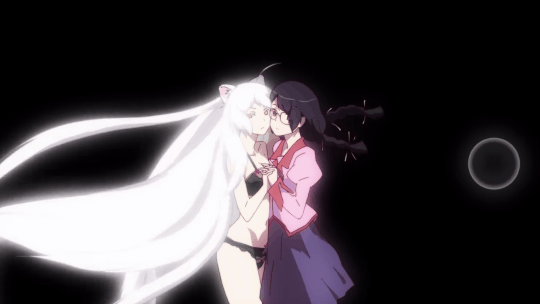
#merry mumbles#monogatari#tsubasa hanekawa#hanekawa tsubasa#this is soooo long and so unorganized and not even half of what I could say i'm just too sleepy to keep going fdskjhfd
14 notes
·
View notes
Text
Ougi and Araragi
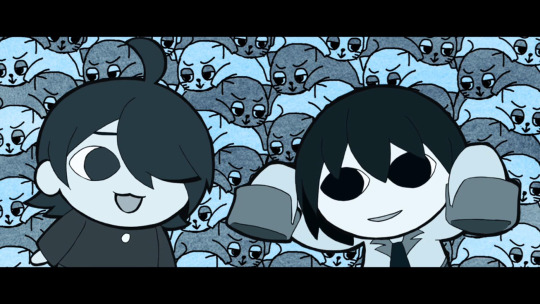
Hi! I was wondering if you could write a meta about Ougi from the Monogatari series.
It’s impossible to talk about one of them without talking about the other, so let’s discuss the unique relationship between Ougi and Araragi underneath the cut, the special relationship between a boy and his shadow.
1. Character Concept: The Jungian Shadow
There’s a lot that can be discerned about Ougi just from the type of character they are. Their relationship with Araragi defines them entirely, without Araragi there is no Ougi.
Ougi’s design is intentionally meant to parallel Araragi’s. Araragi has a very bland light novel protagonist kind of look to him (hence why he never gets any cover art) his only distinguishing feature is that his hair is styled to cover one eye at almost all times. This is because Araragi’s primary character trait is obfuscation looking at things through only one eye you are never going to get the entire picture.
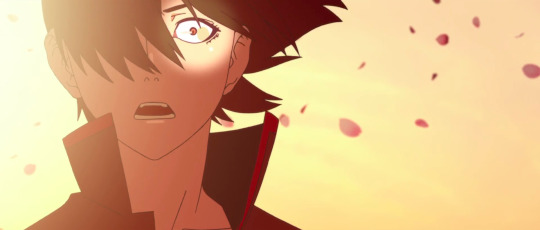
If Araragi’s character design is plain and normal, because that is what the primary protagonist type of these kind of series are an ordinary high school boy, then Ougi’s is the opposite, their design is attention grabbing and unique. If Araragi is normal, Ougi is visibly abnormal, you can already tell there is something subtly off by looking at them. What Araragi hides underneath the surface, Ougi is.
The primary feature of Ougi’s face and the one you notice immediately is their eyes, large, dull eyes, which are the focus of their entire face. Ougi is always shown staring forward with those eyes, unblinking, directly at you. It’s symbolic, eyes are symbols of insight, if Araragi obfuscates then Ougi sees everything. Ougi also wears the Naoetsu high girls uniform. They take the appearance of what Araragi cares about the most, a girl that he can save. Their skin is pale, and their hair dark, which could mean two things, either black and white, light and shadow kind of thinking that Ougi represents or, it’s just supposed to make them look like the kind of ghost that is common in Japanese horror.
Finally, Ougi’s sleeves are so long that their hands are almost never shown. This indicates two things, one human hands are signs of intimacy. What are your hands for? is a pretty famous quote from Evangelion, by never showing their hands Ougi cuts off intimacy because they exist as a symbol of isolation. The next is that Araragi is characterized as someone who always reaches out a helping hand, whereas Ougi is the opposite they stress individual agency and often leave others like Nadeko to their own fate. They may orchestrate things from the shadows, but ultimately Ougi never directly acts, and let’s the characters decide to step off the cliff all by themselves.
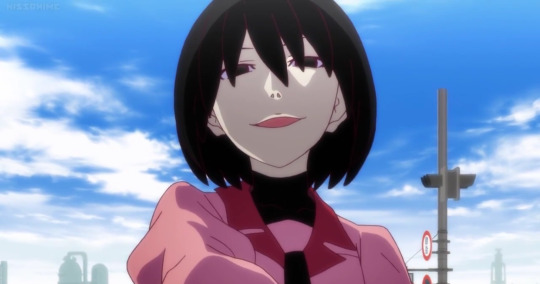
The fact that Araragi a boy, makes Ougi appear as a girl is also a play on binary gender. Ougi is technically genderless, but they appear as a girl initially because themes of binary opposition, and black and white thinking are at play in their character. Araragi is someone who tends to see the world in a binary way. Light and dark, black and white, male and female, they assume there is some kind of proper order to the world that needs to be followed. When Araragi begins to let go of these ideas Ougi is freer to express their gender any way they like.
A binary opposition (also binary system) is a pair of related terms or concepts that are opposite in meaning. Binary opposition is the system of language and/or thought by which two theoretical opposites are strictly defined and set off against one another.
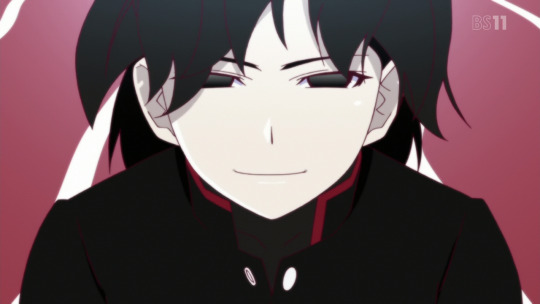
Ougi is based primarily on two ideas. One of them is a pretty obvious reference to the King of Distortion from Boogiepop, which is the series which started what we now call ‘Light Novels’ in Japan by popularizing urban stories with heavy sci-fi or fantasy elements. Araragi even directly references the king of Distortion.
“Tell me, what are you thinking about now...?”
“Don’t suddenly become the king of Distortion.”
Out with the cool quotes, scolded my sister. I deeply reflected on it. (Nekomonogatari White).’
The king of Distortion is a character who’s physical appearance and personality changes with every character they interact with, and who is able to enter the dreams of other people and see the desires in their heart after which point he makes an attempt to correct them.
While the King's personality changes with whatever person's form he is taking, in general, he seems to share a soft-spoken, calm and collected attitude each time, always seeming confident, most likely because of his knowledge of distortions in the hearts of each person's subconcious he enters. He claims his goal to be to 'turn the people's suffering into gold', which involves having people deal with their inner turmoils and coming to terms with them, which is why Boogiepop does not consider the King an enemy of the world, as he doesn't truly do anything particularly villainous.
King of Distortion like Ougi is also born from a single character’s regrets. The King of Distortion was born the moment Shirou Tanaka arrived at the Moon Temple. The main cause for the King's creation was the pent-up regret Shirou felt after entering a relationship with Naoko Kamishiro even though he didn't love her, figuring that he would just develop feelings for her later. After the girl's death, Shirou's self-hatred grew as he realized he wasn't particularly affected by her death in any real way. These feelings were also amplified by the fact that he knew about Akio Kimura, someone who truly loved Naoko, and deserved her way more than himself. These complex feelings of his manifested as the King of Distortion, a being born from Shirou's MPLS evolution.
King of Distortion is an entity born from repressed regrets and self hatred, what a character refuses to acknowledge about themselves or confront. Therefore, both King and Ougi are Jungian shadow archetypes.
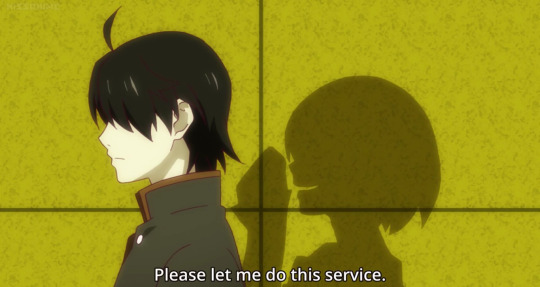
Both as one, one as both.
One is both, both are one.
The Niounomiya siblings with their slaughtering magic.
He and she pass their time in the same body.
Passing their shuttered time.
Passing their shuttered space.
She is Jekyll, and he is Hyde.
One as both, both as one.
Both are one, one is both. Hitokui Magical - [x].
Robert Louis Stevenson wrote the now famous tale, The Strange Case of Dr. Jekyll and Mr. Hyde, a story famous for its astute psychological insight that “Man is not truly one, but truly two.”
In Stevenson’s novel, Dr. Jekyll is a well respected doctor who cares deeply about the admiration of others and strives to be a good human being. In his laboratory he concocts a potion that when ingested transforms him into Mr. Hyde a primitive, unruly and destructive man. Reflecting on the nature of his transformation, he discovers a truth about the nature of a human being.
“I learned to recognize the thorough and primitive duality of man; I saw that, of the two natures that contended in the field of my consciousness, even if I could be rightly said to be the either, it was only because I was radically both.” [Source.]
The shadow exists in a dual relationship with the persona, developing in turn with it. In Jung’s terms the self, is the sum total of the psyche. Both is one, and one is both.
The persona comes from the latin word for “mask”, it’s the elements of personality which arises “for reasons of adaptation or personal convenience.” [Source.] It’s a simple idea, the way you talk around your friends is different from the way you talk in front of your grandmother. People are constantly choosing consciously which parts of their personality to show in front of others, especially in relation to how they would like to be perceived. It is a performance, but that does not mean it is not real. Every part of the identity matters.
It leans heavily on embodying only one’s best qualities, leaivng all those negative traits which contradict the Persona to form the “Shadow.” Jung called the shadow the part of the psyche the unconscoius aspect of the personality. Because one tends to reject or remain ignorant of the least desirable aspeccts of one’s personality, the shadow is largely negative. It consists of everything which exists outside of the light of consciousness, but it can be both positive and negative. “Everyone carries a shadow”, Jung wrote, “And the less it is embodied in a person’s life, the blacker and denser it is.” The shadow is unscious, things which our mind experiences but we cannot control, dreams, desires, instincts.
Without a well developed shadow, a person can easily become shallow and extremely preoccupied with the opinions of others, much like how we see Araragi act in Monogatari. Jung believed that, not wanting to look at their shadows directly, many people project those flaws onto other people.
In terms of literary theory then, the Jungian Shadow archetype is a character who is made up of all the flaws that the protagonist refuses to confront. They challenge the protagonist merely by existing, because the protagonist wants to look away and leave those qualities unacknowledged. Often, they are an antagonist merely because the protagonist projects all of the flaws they cannot see into themselves, onto that other person.
2. Araragi Koyomi - He Obfuscates
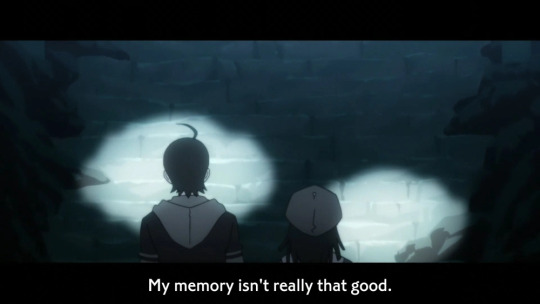
It is impossible to see the shadow without the light. It is impossible to describe Ougi without first talking about Araragi Koyomi. Just like Ougi, let’s start with the origins of his character. While this is just my own personal speculation I’m not NisioIsin, Araragi has always read as written in response to two things to me: First Ii-chan, the protagonist of his first series Zaregoto, and second harem protagonists in general.
II-chan and Araragi are both very flawed and non-confrontational human beings, but whereas Zaregoto is a story about how II-chan really does not want to change himself and instead just kind of wants to stay treading water, wants to never cause any more ripples, wants to hold onto the fragile sense of self he has Araragi’s is a story of a bad and hypocritical, shallow kind of person striving to grow up and become a good person, acquire depth.
The stereotypical harem protagonist is this, a plain guy with no personality who somehow gets girls to fall all over him, often for showing them the bare minimum of kindness. Monogatari is partially a deconstruction of harem series because it shows the kind of circumstances that would cause all these girls to fall all over one guy, literally they are all so deprive of affection that the smallest show of kindness does actually make them fixate on Araragi.
The thing is Araragi does have a clear personality. He is very cynical, he’s judgemental of other people, he really likes to snark. Part of the reason he likes talking to Senjyogahara so much is he can be meaner, and sharper tongued than he normally presents himself as around people. He has traditional black and white views of justice. He tends to meddle. He is observant, but his style of thinking is flawed because he tends to jump to conclusions quickly rather than thinking out the details slowly and methodically. He’s almost constantly anxious, but usually responds to the anxiety with avoidance. However, a lot of his more distinct personality traits sound more negative rather than positive, so Araragi has a version of himself he presents to others who he is less close to. This ‘self’ is much more vague, and wishy-washy, very go with the flow. Despite the fact that Senjyo and Hanekawa both comment that Araragi is well known among the students as a delinquent, Araragi himself says that he’s a typical high school student with a completely normal personality. He defines himself as vague on purpose, that sole purpose being to appear as more acceptable to others, because like an ego that refuses to acknowledge his shadow Araragi is very shallow and defines himself entirely on the opinions of the other people around him.
He is lacking a sense of self, or rather that sense of self eventually escapes from him when his shadow runs away Peter Pan style and becomes Ougi.
Araragi has three primary character flaws that manifest in the form of Ougi, Araragi is a hypocritical altruist who only cares about weak girls that need to be saved, Araragi obfuscates, and Araragi only thinks in black and white.
Araragi is not someone who helps people because it is the right thing to do. He does not do good deeds because they are good. He only helps others because there is something he gains out of it. One thing that’s important about Araragi is that he has a cripplingly low self esteem, to the point of self harm, self flagellation, and even suicide attempts.
He literally says so when he finds Kiss-Shot’s body, his first response is not to call for help but rather to try to let Kiss-Shot kill him, apologizing for living such a worthless life until this point. It’s not just that Kiss-Shot was in trouble, Araragi also made it about his own self loathing.
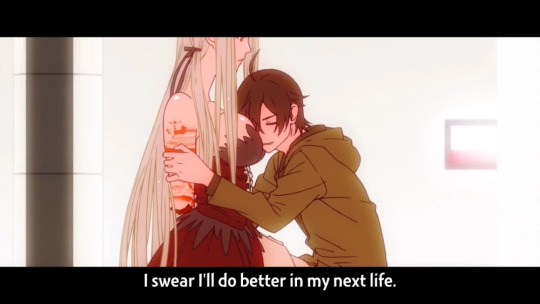
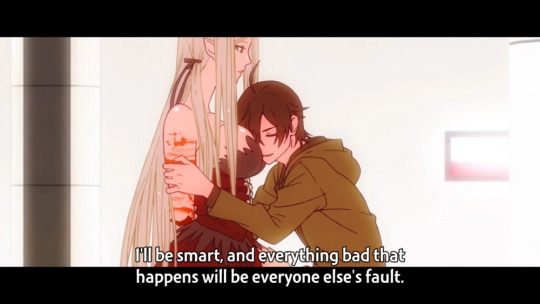
Araragi seems selfless to a fault, but he’s actually very self obsessed. While it’s true that Araragi desires to be a good person, and improve as a person, his methods for self improvement are faulty. He’s obsessed with appearances, and it’s more like he wants the appearance of a good person rather than actually having to put in the work at first. He wants to feel like he’s saved others. He wants to feel like he is someone worth something. He saves others because it increases his self worth, and also once again he gets something out of it. Araragi saving women that are weaker than him makes him feel special, like somebodyy needs him.
He wears the persona of a hero, rather than actually trying to be one. It happens again and again in the series. Despite the fact that Araragi actively does heroic things literally all the time, he also denies any role of being a hero because he does not want the responsibility of being one. Araragi wants the world to be burger king, he wants to have it his way. He wants the best of both worlds, Hannah Montana style. He wants to save girls, but he doesn’t want to be their hero and be entirely responsible for them.
“Araragi-kun, even if you can become a star, you can’t become a hero.”
“I can’t become a star.”
I shook my head.
“I can only become a vampire.”
And I even failed at that.
“I see.”
So you’re not going to be - my hero.
Nekomonogatari: White (Hanekawa and Araragi)
Take his actions in Nekomonogatari. Araragi claims it’s impossible to be a hero, he says that Hanekawa cannot be saved and calls for her to take personal responsibility and face everything that is wrong with her life. However, rather than trying to just support her with that difficult task Araragi immediately jumps to self harm.
It’s impossible for Araragi to become a hero, but he can swallow a katana and then trick Hanekawa into killing him because that is somehow easier than facing his feelings for Hanekawa head on. Araragi prefers bloody, painful self harm to the terrifying ordeal of being known. Araragi knows that Hanekawa is in need of help, but the fact that she is such a messy person different from the person he originally saw her as, makes him afraid of her.
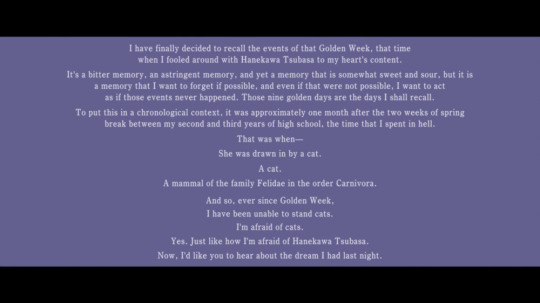
The thing is human beings are really sloppy. They are a messy gray, and Araragi wants to save them, but he really is just a kid out of his depth with a lot of things. He sees the abuse of Hanekawa’s household, and because he’s literally never even encountered an abusive life he gets so terrified that he runs away screaming. He does care about Hanekawa, but she’s far too complicated for him. He does not even want to touch that mess. It’s much easier for him to see Hanekawa as a hero, all black, or all white, then try to attempt something he does not know how to do and could screw up Hanekawa even worse.
Once again while it is not Araragi’s responsibility to fix an abused girl, and it makes sense a normal high school kid does not understand coping with abuse at all, Araragi at the same time wants to help her. Instead of just admitting that he can’t do anything for Hanekawa, he play-acts at being a hero.
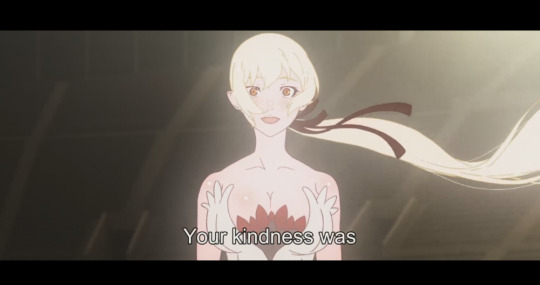
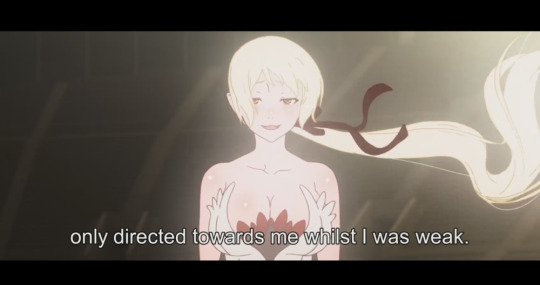
Here’s the thing about Araragi, have you ever once seen him try to save a boy? He only cares about helpless girls because those are the kind of people that heroes save. He does not care about people that are stronger than him, because then he is depending on them rather than the other way around. Araragi only interacts with about three male characters in the story significantly.
Oshino, who is an adult figure that Araragi aspires to be like, and then Kaiki and Seishirou who he both views as rivals for the two most important girls to him Senjyogahara, and Seishirou. Do you notice there is a far different tone in Araragi’s interactions with Seishirou and Kaiki? Araragi absolutely refuses to see Kaiki as anything other than a villain, and while Seishirou is clearly a victim, Araragi cares very little about actually saving him and instead prioritizes competing with him over Kiss-Shot.
Once again this is dude psychology that is present in Harem series. Did you notice if male characters do show up in harem series they are oftentimes, either comic relief, they are terrible people for the main character to look good in comparison, or they are old men mentor types. That is because any other man who would exist in a harem series is automatically competition for the girls. Araragi does not want to compete, he does not want to feel inferior to anyone else, because he always feels inferior all the time therefore he never has any male friends.
Therefore it’s hypocritical altruism, while Araragi is willing to help and that’s a good thing, he also never once helps unless there is something he gains from it. Even if it’s a chance to exercise his self loathing. Once again Araragi’s self loathing is incredibly harmful, he literally gets bones broken, limbs severed, and organs torn out almost every time he helps someone. Not only that but it’s always the first solution he jumps to. This is not the behavior of a healthy person, this is the behavior of someone attempting to punish themselves. Helping these girls by martyring himself is an act of attrition for Araragi, because he believes he deserves pain for all of his hypocrisies, but once again it’s still self obsession. Just hating yourself, just beating yourself up, is different from having to do the actual work of facing yourself and picking yourself up. Araragi will always choose dishonesty over honesty, obfuscation over seeing things clearly.
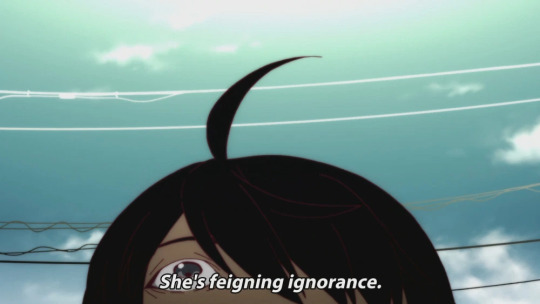
Araragi’s primary strategy of dealing with these many hypocrisies and contradictions in himself, and keeping his ‘ego’ in balance has always been obfuscation. Araragi is observant, but he presents himself as ignorant. He always goes on claiming how stupid he is, and how he’s nothing more than a worthless washout.
This is because Araragi was raised with an overpowering sense of responsibility. While his parents are not necessarily bad parents, they are police officers. He was raised made to feel responsible for things like justice, saving others, and especially made to feel responsible for his own flaws. Police officers are also symbols of justice, who as human beings often fall far short of the law and authority they are supposed to represent, because symbols are symbols and humans are humans.
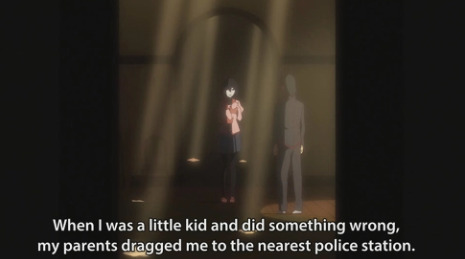
Therefore, what Araragi wants to avoid at all costs is feeling responsible. He wants to be important, but he never wants to take the responsibility of actually being important. This is his immaturity, the part of him that refuses to grow. For Araragi, if situations are too complicated for him to handle, or he fears his meddling will only make things worse and therefore he will be indicated as responsible his response is to just avoid it entirely rather than struggle or try.
This is shown in the case of Sodachi Oikura, once again someone that Araragi knew about and sympathized with but at the same time could not comprehend. Sodachi lived in horribly abusive circumstances, and both times Araragi encountered her he was a child. Araragi at the same time takes far too much responsibility, and far too little. It’s completely understandable that Araragi a middle schooler had no idea what to do to deal with what was obviously an abusive household, most adults are pretty useless when it comes to handling abused children. Yet, at the same time Araragi avoids any responsiblity whatsoever, he just forgets about Oikura claiming he has a bad memory depsite encountering her at three different significant parts of his life. Rather than struggle and fail, it’s better for Araragi to just not know anything at all therefore it can’t be his fault.
When Ougi drags Araragi through Sodachi’s case, Ougi ‘deduces’ everything, but Ougi’s catchphrase is I only know what you know. Ougi cannot have come to a conclusion that Araragi did not already know or was not capable of figuring out on his own, Araragi just did not think of those things because it was too painful to think.
This is also present in his dealing with other characters. There are several characters who have heavy romantic crushes on Araragi while Araragi is already in a relationship, Nadeko, Hanekawa, etc... Rather than ever just going through the awkward interaction of rejecting them it’s much easier to just pretend he never even notices their affections. Therefore we see him hypocritically, have a girlfriend, at yet at the same time constantly hang out with other girls who have a clear attraction to him and romantic feelings for him and never do anything about it.
Nadeko turns into a god because of obfuscation, both on Araragi’s part and on Nadeko’s. Nadeko is called out for what a hypocritical person she is never wanting to face anything directly, but that behavior is only a reflection, a foil to Araragi’s own, hence why Araragi was never able to save her.
Once again, Nadeko clearly has several problems with her personality, and she also blatantly hits on Araragi several times despite one being a middle schooler, and two Araragi having a girlfriend. Rather than just reject her outright, or acknowledge these parts of her personality, Araragi chooses to ignore everything and reduce her to being a cute girl. Nadeko puts on the act, and Araragi perceives. He then ignores all of her feelings, until they repress more and more and then bubble out into a jungian shadow expression that is Snake God Nadeko who just indulges on all of her instincts and desires and gives up conscious thought and her persona completely.
Ougi always mocks Araragi has a helpless fool, because that is what Araragi wants to be, helpless, foolish, and therefore not at fault when there are unintended consequences of his actions.
Finally, Araragi only thinks in black and white. This is also part of his obfuscation, he never wants to acknowledge how complicated people are. When he’s forced to confront the ugly side of people he almost always looks away.
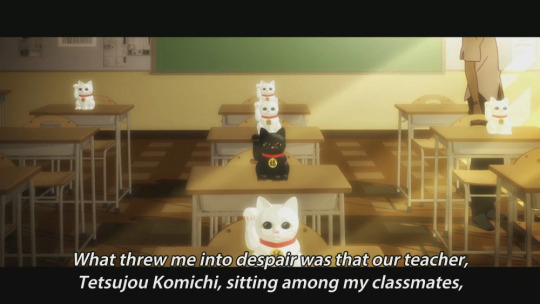
Black cats, white cats, hmmm, I wonder what that means. Araragi was only disappointed with the idea of justice, because he wanted to believe in it in the first place. He wants to believe that things like heroes can exist, and that his black and white perceptions of the wolrd are real. Araragi craves that order more than anyone else, perhaps even more than his younger sisters who just play at being heroes of justice. The reason he becomes so disillusioned is because he expects there to be an order of things, for their to be roles just like in a story, for their to be a sequence of events with meaning.
Araragi expects narrative rules to apply to real life. For life to have meaning. That is why he is a story teller. There are monsters and oddities, and humans with a clear line between them, despite the fact that Araragi himself is someone who blurs these lines by existing as a quasi vampire. Araragi’s life is a story that he tells himself, and that’s why it’s so important that his perceptions are so off. In Tsuki he even gets called on this twice, he calls his increasing vampirism punishment instead of just consequences for his actions and he’s told not to think he’s so special that god would go out of his way to punish him. Tadatsuru asks why they are facing off like this, why Araragi is protagonist and he is antagonist.
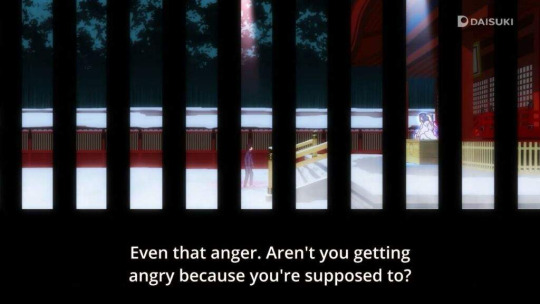
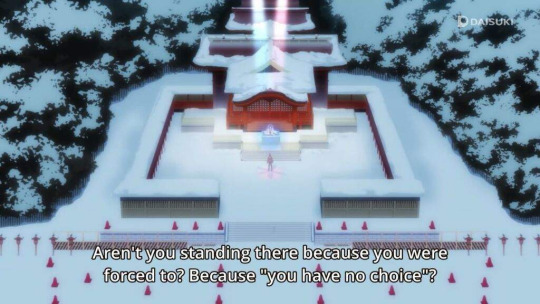
Araragi does not like acknowledging how sloppy the world is, because that makes him feel insignificant and weak. It would make anybody feel that way, because it means acknowledging that we are not as in control of things as we would like to be.
3. Oshino Ougi - They Reveal
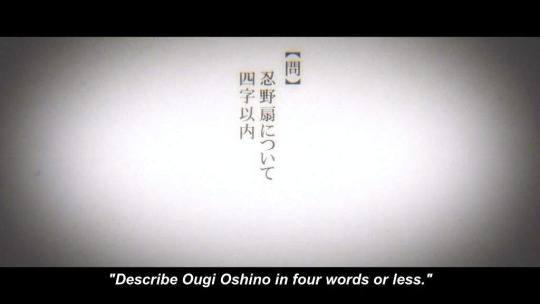
Ougi Oshino is Ougo Oshino.
They are a vague existence, Araragi refuses to define them because defining Ougi means defining themselves and that kind of confrontation is the last thing Araragi wants.
Ougi Oshino is born out of a desire for Araragi to punish himself, the same way he always seeks external punishment by allowing people to beat him up and rip out his intenstines. Rather than confront what is inside of him, Araragi externalizes it and confronts it as an external force which he projects upon.
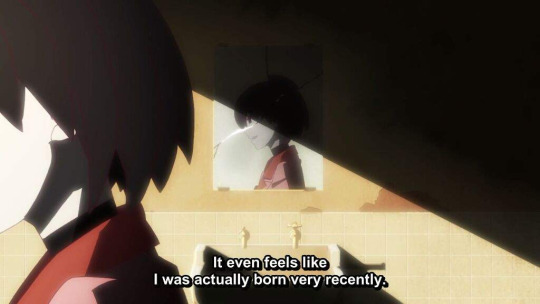
Ougi is a shadow born from the light of Araragi’s ego. It was not the darkness that created them, but rather Araragi himself and the shadow he cast. Therefore while Ougi can be seen as a corrective force, they actually embody all of those flaws that Araragi has, and their own character traits are always in response to those flaws.
Wheraes Araragi is a hypocritical altruist, Ougi is someone who exists to fix people’s mistakes, or punish them for their mistakes rather. Despite manipulating them, Ougi also ultimately leaves them up to their own fate. He leads them up to the cliff but does not push.
Ougi is a hypocritical fixer, because while he seems to be punishing others for their mistakes he really only exists to punish himself in the form of Araragi. All of the ‘mistakes’ he corrects are just Araragi’s own mistakes foiled in other people.
Nadeko is a foil to Araragi, she represents his own feigning of innocent and being unknowing. Kaiki is a foil to Araragi, he represents how much of a fake Araragi is by pretending to cling to ideals of justice and saving others but also denying them as well. Sodachi is also like Araragi, they both prefer to wallow in misery than try to work towards their own happiness. Araragi even says his famous line with his relationship with Shinobu, an ending where everyone is miserable, where nobody gets what they want. There are serious problems with his current relationship with Shinobu, a power imbalance, and both know they cannot last this way forever but rather than attempting to fix their relationship they both cling to the way thing’s are.
Repression and obfuscation is always favored over directly addressing the issues, especially the things which Araragi probably cannot control, or fix, like the complicated nature of abuse. Ougi claims they operate out of some imaginary set of rules that totally exist, but once again Ougi is the hypocrisies of Araragi laid bare. They are every bit the hypocrite that Araragi is.
They are just punishing other people who reflect Araragi’s negative traits. Those who do not acknowledge their shadow, will project their flaws onto other people and see themselves in other people in order to cope.
Ougi is made up of Araragi’s repressed desires. They are a girl he wants to save, which is the only type of person Araragi interacts with. At the same time, they are also connected to Oshino, who is Araragi’s model in the series for adulthood and maturity. Oshino who is always able to figure things out, and very self-collected often making fun of Araragi for his youthful excitement and his naivete for not knowing much about the world.
While Araragi presents himself as an idiot, Ougi is intelligent an capable of figuring things out from scraps of information. Araragi jumps to conclusions, Ougi is deductive and a good thinker. Ougi Oshino already knows Araragi better than himself, therefore Araragi does not have to carry any of the burden of self reflecting, or making himself known to other people around him.
During Ougi and Arraagi’s first meeting in the anime, he hallucinates that the classroom that he is locked inside of floods with water. The depths of the water, the shadow, dreams, these are all the realm of Jung. If the conscious mind is the water’s surface, then the subconscious is its depths.
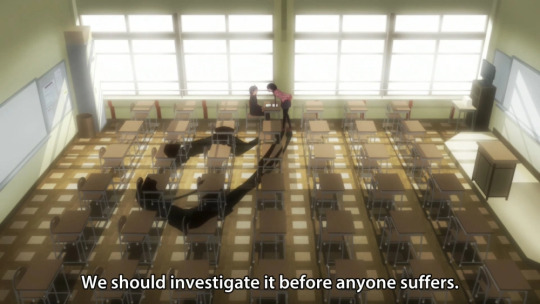
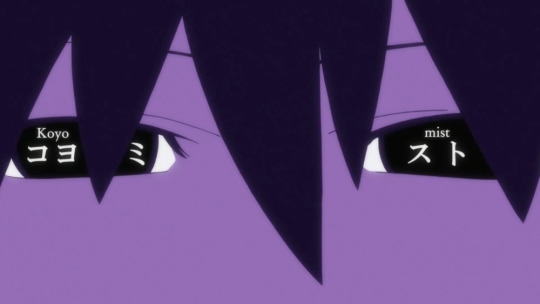
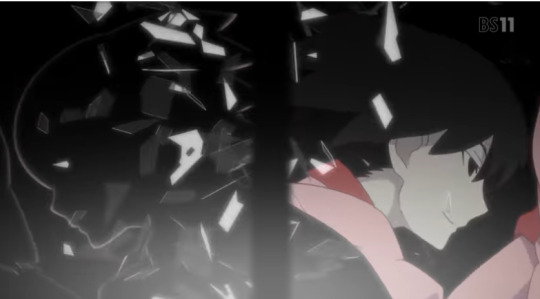
Araragi obfuscates, whereas Ougi reveals the uncomfortable truth. Ougi always positions themselves as a detective. In the realm of stories, it is the detective who makes the big reveal at the end. After all Ougi even says when they are locked in the room together, because there is no famous detective that Ougi themselves will play the role and announce the culprit.
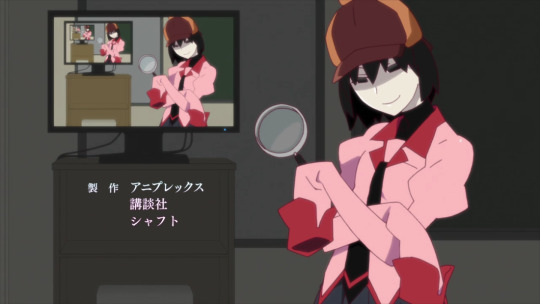
However, Ougi’s reveals are just as hypocritical as Araragi’s obfuscations. Ougi takes the shadow to be representative of the whole self, because they themselves are a living breathing Jungian shadow, but just like Jekyll and Hyde man is both. He is not one or the other, he is both at the same time. Ougi always act with the assumption that there is some kind of truth to be revealed, that this is just like a detective novel where there is a reveal waiting at the end.
Ougi takes the repressed desires to count as the “truth” of the whole mind, and ignores the conscious mind entirely. Therefore, in their view Nadeko is only capable of being a selfish cute girl who sees herself as a victim, Hanekawa is only something scary which Araragi must avoid. They at the same time as Araragi both read the same black and white narrative of the world. They do not care at all for the persona, or how people choose to present themselves. Desipte what Kaiki said to Nadeko that people can choose to be whoever they want to be, and they can try as many times as they like.
Ougi also views themselves as inhuman, and therefore incapable of doing anything, or defining themselves as anything outside of their role. Ougi is in a way, just as repressing of themself as Araragi is. They even lament this in front of Tsukihi, that once the detective reveals the mystery the novel is over. That if anybody would know the truth of them, they would come to hate them because they are abhorrent.
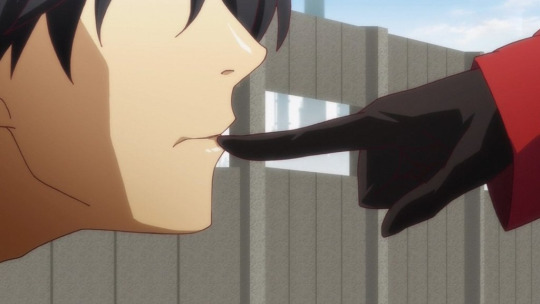
Ougi by repressing concious thought, silences other people and what they have to say about themselves. The only thing that matters is the repressed, what Ougi dictates as the truth must then become the truth. It’s just as much a limited way of saying the world as Araragi’s is. Hence Ougi’s famous catchphrase, I don’t know anything, you’re the one who knows. Ougi sees themselves as a person fundamentally incapable of knowing anything other than outside the bounds of what Araragi already knows.
Which is finally where the black and white thinking comes in. While the two of them seem like polar opposites, their views of the world are actually the same. Ougi wants what Araragi wants, for the world to exist like this is a story. For there to be roles, and order and most importantly meaning. The same way that Araragi just ignores things that fall out of step with their roles, when people contradict the way Araragi sees them he just pretends to be oblivious rather than see them as complex human beings. Ougi actively goes out of their way to punish people, for not playing the role in the story they were supposed to play. He acts like a corrective force, pushing people back into their roles. His wrongful assumption is not that people improve by “correcting mistakes” but rather there was a proper path in the first place. That there was a hero’s journey they were supposed to be going on. There is no path, there is no meaning, it’s all senseless but Ougi exists out of a desire for things to be sensible.
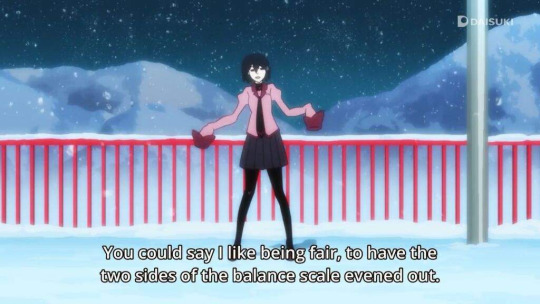

Ougi exists as Araragi’s opposite, because Araragi assumes that things like binary opposites exist in the first place. Heroes and villains, crime and punishment. They both believes these things exist in a fundamental order in the world, and they are not just made up values that humans invented and give meaning to.
“Let’s not joke. Virtue is the antonym of vice, not of crime.” “Are vice and crime different?” “They are, I think. Virtue and vice are concepts invented by human beings, words for a morality which human beings arbitrarily devised.” (No Longer Human, Osamu Dazai)
For both of them clinging to these hypocritical beliefs are better than the alternative, admitting to their own helplessness in the face of a world that is mostly indifferent to them.
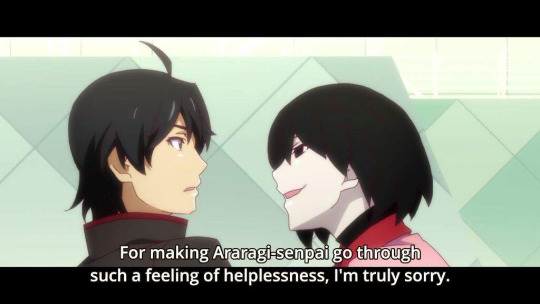
That’s why, when they are separate both of them choose to stick to their ultimately restricting and punishing roles, as protagonist and atagonist, persona and shadow, hero and villain, rather than just trying to acknowledge themselves and live as people.
Both is one, and one is both.
Araragi Koyomi and Oshino Ougi have a relationship that ultimately results in not antagonism, but rather union and acceptance. Just like the King of Distortion is not an enemy of mankind in the enemy, Ougi was never an enemy to Araragi in the first place. Araragi never needed to hate himself or punish himself. The true path forward lies in union and acceptance.
You can never be anything more than yourself, nothing more and nothing left.
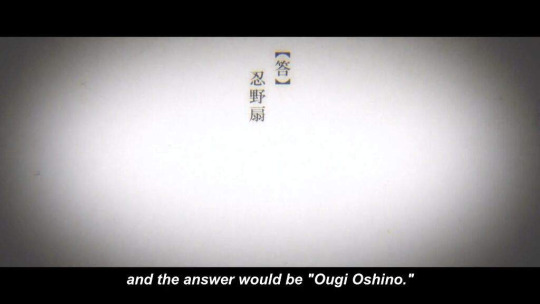
71 notes
·
View notes